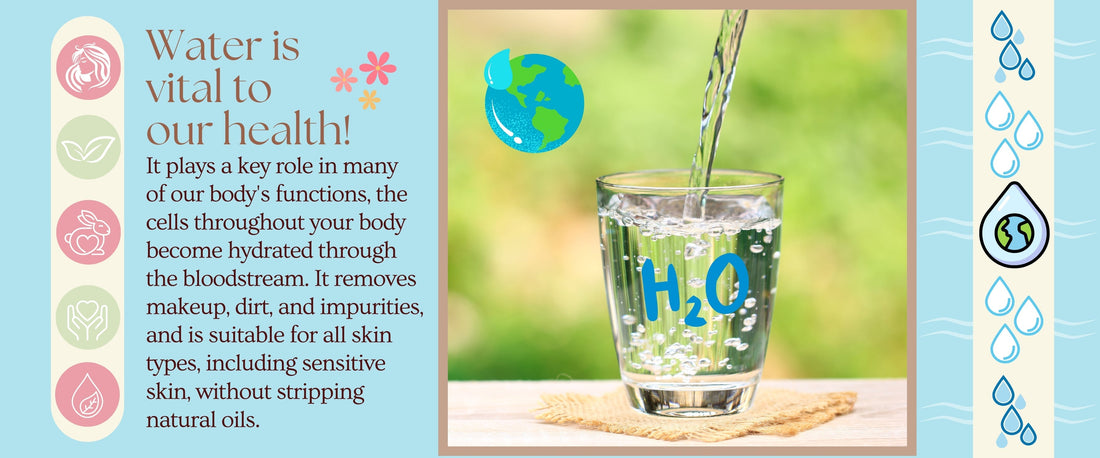Water is a fundamental element in our daily lives, not just for hydration but also as a crucial component of our skincare routines. At Essentials Everything Skin Care Co., we believe in understanding every facet of this vital resource, from its quality to its temperature, to ensure optimal skin health.
The Quality of Our Drinking Water
Before diving into the role of water in skincare, let's address a pressing concern: the quality of the water we consume daily. Is unfiltered tap water safe for drinking or even cooking?
Alarmingly, contaminants such as Aluminum, Ammonia, Arsenic, and even harmful Bacteria and viruses have been detected in our tap water. A report from the Environmental Working Group highlights the regulatory lapses in ensuring the safety of America’s drinking water. With no legal limits set for over 160 unregulated contaminants, the safety of our tap water is in question. For those interested in delving deeper, here are some additional resources to explore.
One solution we trust is the Berkey black filter/fluoride filter system. Their test reports showcase the efficacy of their filters in removing harmful chemicals. It's a system we use for drinking, cooking, and even for the water-based products in our skincare line.
The Impact of Contaminants in Water on Skin
You often hear that you need to drink eight 8-ounce glasses of water each day. The Institute of Medicine's Food and Nutrition Board recommend that women drink more than 11 8-ounce glasses (91 ounces) of water daily, and men drink more than 15 glasses of water (125 ounces) per day.
While we've discussed the importance of water quality in our daily consumption and skincare routine, it's crucial to delve deeper into the potential repercussions of contaminated water on our skin. The skin, being our body's largest organ, often reflects the state of our internal health, and the quality of the water we consume plays a significant role in this.
- Dehydration: Lackluster water quality might not offer the hydration our body needs. When the skin is dehydrated, it can appear dull and dry, showing signs of premature aging, such as fine lines.
- Breakouts and Acne: Certain contaminants can disrupt the skin's natural oil balance, leading to unwanted breakouts and acne flare-ups.
- Irritation and Redness: Pollutants and chemicals in water can be harsh on the skin, causing irritation, redness, and even rashes in sensitive individuals.
- Exacerbation of Skin Conditions: If you suffer from skin conditions like eczema or rosacea, poor water quality can aggravate these issues, leading to more frequent or severe flare-ups.
- Barrier Disruption: Our skin has a natural protective barrier. Contaminated water can weaken this shield, making the skin more vulnerable to infections and external irritants.
- Discoloration: Some elements, like arsenic and iron found in water, can lead to skin discoloration or dark spots.
- Tightness and Dryness: Hard water, rich in minerals like calcium and magnesium, can leave a filmy residue on the skin, causing it to feel tight and parched.
- Allergic Reactions: Some individuals might be allergic to specific contaminants in water, leading to skin reactions upon consumption or contact.
- Absorption of Harmful Chemicals: Our skin can absorb harmful chemicals present in water. Once these chemicals enter the bloodstream, they can manifest as skin issues or other health concerns.
- Premature Aging: The cumulative effects of poor-quality water can accelerate the skin's aging process, leading to a loss of elasticity, increased dryness, and the appearance of age spots.
Understanding the potential hazards of poor drinking water underscores the importance of ensuring the water we consume and use in our skincare routines is of the highest quality. It's not just about quenching thirst; it's about safeguarding our skin's health and vitality.
Achieving your best skin isn't just about high-quality, all-natural products. It's about understanding the symphony of elements that come together in your skincare routine. While the products you select play a starring role, there are unsung heroes in the backdrop, significantly influencing your skin's health and radiance. One such game-changer? The temperature of the water you use to cleanse your skin.
Water Temperature is Beneficial to your Skin Care
The temperature of your cleansing water can directly impact the effectiveness of your skincare routine. It affects how well your products are absorbed, the efficiency of impurity removal, and even the post-cleansing feel of your skin.
Lukewarm Water: The Ideal Choice
Balancing between the extremes of hot and cold, lukewarm water stands out as the most skin-friendly option.
- Effective Cleansing: Lukewarm water can proficiently remove dirt, excess oil, and makeup without being abrasive.
- Preservation of Natural Oils: Unlike hot water, lukewarm water doesn't strip the skin of its natural oils, ensuring it remains moisturized and protected.
- Optimal Product Absorption: Post-cleansing with lukewarm water, the skin is primed to absorb skincare products, maximizing their benefits.
Integrating Water Temperature into a Comprehensive Skincare Routine
For those new to skincare or seeking to refine their regimen, understanding the role of water temperature is essential. We recommend our Easy 6-Step Skincare Routine as a thorough guide to achieving that enviable skin glow. This guide offers insights into product selection, application techniques, and other best practices, ensuring you derive maximum benefits from your skincare routine.
Margaret 💦

